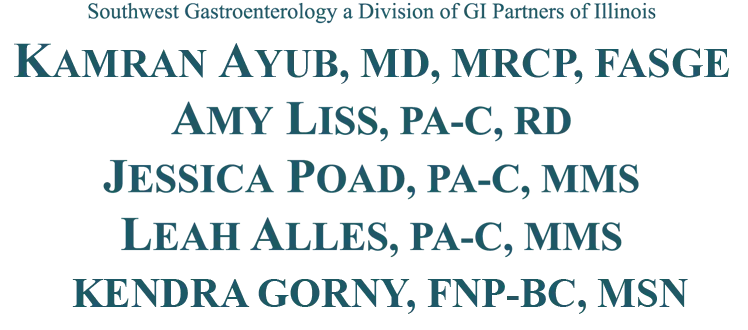What is Pancreatitis?
The pancreas is a gland found within the abdomen that is an important part of your digestive tract, as it provides the body with the enzymes it needs to break down food. It’s also responsible for regulating your blood sugar. Sometimes the pancreas can become inflamed. While heavy alcohol consumption and gallstones are the two of the most common reasons for pancreatitis, there are other reasons why both acute and chronic forms of pancreatitis manifest. If you are dealing with pancreatitis our gastroenterologist Dr. Kamran Ayub and his team are here to help.
The most common symptom of pancreatitis is abdominal pain. The pain is most often felt in the middle of the stomach or on the upper left side. The pain can also be exacerbated by eating or by lying down. Along with abdominal pain, you may also encounter nausea, fever, dehydration and a rapid heartbeat. If you are experiencing any of these issues it’s important that you turn to a gastroenterologist who will be able to determine the cause of your abdominal pain. The sooner pancreatitis is detected and treated the better.
In most cases, pancreatitis-related abdominal pain tends to be pretty severe, which can raise some immediate red flags. Some patients may even choose to go to their local urgent care or emergency room if the pain is serious enough.
When you come in for treatment we will perform blood tests and imaging tests (ultrasound, CT scan) to check liver, kidney and pancreas function along for any potential signs of infection. These imaging tests can also check for gallstones, which could be the root cause of your problem.
The treatment plan you receive from us will depend on the type and severity of your pancreatitis. In acute cases, hospitalization is often required in order to provide the proper medications and nutrients to the body through an IV. Sometimes medication can also be prescribed for the pain. If an infection is present antibiotics will be prescribed. It’s important that during the first few days that the patient does not consume any foods or liquids (all nutrients are given through an IV).
Those with chronic pancreatitis will require stronger and more long-term medication to handle their pain. We will also discuss diet changes, which will consist of restricting how much fat you consume on a daily basis and increasing the amount of carbohydrates. Patients with chronic pancreatitis should also avoid alcohol, particularly if this is the root cause.
Sometimes surgery is needed, particularly if pancreatitis is caused by gallstones. By removing the gallstones and sometimes the gallbladder we can reduce inflammation within the pancreas in the future.
If you are dealing with pancreatitis in the Chicagoland area, learn more about the different treatment options we offer by calling one of our three gastroenterological offices at (708) 475-5233 in Oak Lawn, and New Lenox, IL. Also serving patients throughout Frankfort, Orland Park and Burr Ridge, IL.
Treatments For Your Bile Duct
Your gallbladder, an organ within the digestive system that lies under the liver, is responsible for storing bile until you eat. Whenever you eat the gallbladder releases bile through these tube-like projections into the small intestines to help break up the food. Unfortunately, there are certain problems that can cause blockages within the bile ducts.
The most common cause of a bile duct obstruction is gallstones. When gallstones form they often form within the gallbladder, causing a blockage within the ducts themselves. When the ducts are blocked this causes the bile to back up and leak into the bloodstream. At this point, two different problems can occur. If the gallstone is between the gallbladder and the duct an infection (cholecystitis) can occur. Cholecystitis causes inflammation within the gallbladder. If you have cholecystitis you may experience serious upper abdominal pain (often on the right side), nausea and vomiting.
Sometimes bacteria forms around the bile duct blockage, affecting the liver and causing a serious bile duct infection known as ascending cholangitis. Just as with cholecystitis, you may experience upper right abdominal pain, nausea and vomiting, dark urine, jaundice (yellowing of the skin) and sometimes a fever.
Cholecystitis and cholangitis are the two most common conditions that can affect or cause obstructions within the bile ducts. Less common causes include bile duct cancer (known as cholangiocarcinoma) and scar tissue buildup (also called strictures). Scar tissue may form as a result of an infection or from a previous surgery.
It’s important to recognize that a lot of these symptoms will come about suddenly and will be severe. When this happens it’s important that you turn to our gastroenterologist Dr. Kamran Ayub for a thorough evaluation. We will ask you questions regarding the symptoms you are experiencing and run a blood test to check your bilirubin (a substance found within bile) levels. We will also go through your detailed medical history and lifestyle to determine if you are at a high risk for liver disease.
Along with a blood test, we may also decide to perform a CT scan or other imaging tests to check the health and function of the gallbladder and bile duct. If we do find an infection you will be given a round of antibiotics to take. Sometimes the gallbladder will need to be removed after the infection has been fully treated.
Since these conditions will only get worse and can lead to liver failure, it is important that you seek the care of an expert gastrointestinal team like ours that can get you back on the road to recovery. The sooner you seek care the better for your long-term health. Call us today at (708) 475-5233 at one of our three offices in Oak Lawn, and New Lenox, IL to learn more about the gastrointestinal services we offer. Also serving patients throughout Frankfort, Orland Park and Burr Ridge, IL.

